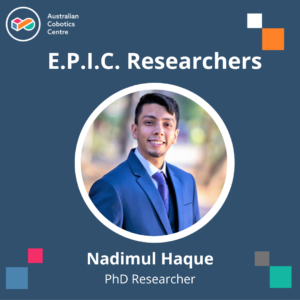POSTED: 23 Oct, 2023
 Nadimul Haque is a PhD researcher based at the University of Technology Sydney and his project is part of the Biomimic Cobots Program at the Australian Cobotics Centre.
Nadimul Haque is a PhD researcher based at the University of Technology Sydney and his project is part of the Biomimic Cobots Program at the Australian Cobotics Centre.
His research interests lie in the applications of deep reinforcement learning in robotics.
We interviewed Nadimul recently to find out more about why he does what he does.
-
Tell us a bit about yourself and your research with the Centre?
I graduated from the University of Dhaka from the Department of Robotics and Mechatronics Engineering in 2020, just before the pandemic hit. While doing my bachelor’s, I was parallelly working as a research assistant on a funded project on agricultural automation, which I continued till June 2022.
The research I am undertaking under ACC is on the effective manipulation of collaborative robots with learning frameworks. I want to create a generalised cobotic control system for complex manipulation tasks. I envision making a learning framework that will allow the cobot to adapt quickly to any scenario and, hopefully, any task. Current systems are generally optimised to work on a particular task under very specific conditions. My research will look to unlock the potential of generalised learning frameworks that will facilitate fast adaptation to the changing environment. This will eventually be tested and applied to industrial scenarios where a cobot can be counted on to perform effectively with humans in a dynamic environment.
-
Why did you decide to be a part of the Australian Cobotics Centre?
I have always wanted to conduct research in robotics that will have a real-world impact. ACC provides the perfect opportunity for me to do that. There is a persistent fear amongst the general masses that robots will replace the human workforce. The center’s ideal of using collaborative robots in industrial spaces could alleviate this issue. I believe that the only sustainable move forward towards an automated industry would be cobots and humans working together. The center will play a pivotal role in this aspect.
The match in ideals is supplemented by the center’s collaborations with established industry partners. The fact that the robotic systems developed will actively be adapted to the industry makes it the ideal playground for a robotics enthusiast.
-
What project are you most proud of throughout your career and why?
It was a simple project where I, with another group member, created a line-following robot equipped with reinforcement learning. The idea was that rather than hard coding the robot to follow a line, the robot would learn how to traverse any path, with the signals from simple IR sensors. Of course, it was not anywhere near as efficient as an optimised LFR, it was exhilarating to watch it learn and slowly but surely, get better. Although most of the projects I have taken on so far have yielded more tangible results, I am most proud of this one as it got me hooked on robotics and reinforcement learning.
-
What do you hope the long-term impact of your work will be?
I hope that my research with the center will pave the way towards generalised robotic controls that can be redeployed into any situation, preferably for multiple different tasks.
-
Aside from your research, what topic could you give an hour-long presentation on with little to no preparation?
Football (The one you play with your feet)
Recent News
Celebrating the Robotics & Advanced Manufacturing Centre at TAFE Queensland!
On 17th June 2025, our Centre was part of the official opening of the Robotics and Advanced Manufacturing Centre (RAMC) at TAFE Queensland Eagle Farm ...
Meet our E.P.I.C. Researcher, Sheila Sutjipto
Sheila Sutjipto is a Postdoctoral Research Fellow in the Biomimic Program where her research explores physical human–robot interaction (pHRI). She ...
Fireside Chat Series Continues with B&R Enclosures
The Australian Cobotics Centre is thrilled to continue its Fireside Chat series with B&R Enclosures, one of our valued industry partners. These i ...